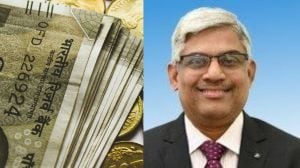Authors and Others
Is the Jaipur Lit Fest over,as everyone says sniffily?
You can almost smell the disdain. The Jaipur Literature Festival,everyone says sniffily,is over,and for two reasons.
First: its drowning under the weight of its own popularity,inundated with thrill-seeking crowds. Indias People That Read,all seven of them,feel unaccountably betrayed,like indie rock fans whose favourite band has signed a record contract. Dealing with the fact that the LitFest is now mainstream,
written about everywhere,and a weekend destination for people who would otherwise be at over-catered soirees in Delhis farmhouse belt,is hard.
Then theres the other complaint. The festivals presiding deities,William Dalrymple and Namita Gokhale,are hardly shy and retiring,but Dalrymple in particular is the most inviting of targets and has been duly targeted: look at the foreigner,coming here,taking our leadership position. He would be little more than mediocre at home,but hes a literary lion here! (Because all our other,unimpeachably indigenous,literary lions are so not mediocre.) Were always looking Westward for legitimisation! (Average English-language print run in India: 2,000. Mental colonisation or simple economics?) So lame,derivative and puerile was the foreign-origin whining that you wound up in the odd position of sympathising with Dalrymple.
So: has the LitFest indeed been killed by its own success? In order to intrepidly investigate,your fearless reporter braved the thundering trucks on the Jaipur highway with no more protection than that provided by a Rajasthan Tourism Development Corporation bus. Note to new highways minister: it took seven and a half hours.
But once there,it becomes clear pretty soon that the LitFest is doing just fine. Yes,it is crowded now,there are fewer places to sit. A small price to pay for the satisfaction of seeing so many generally well-behaved and interested people lapping up,with the desperation born of long exposure to our sterile public discourse,new ideas and broader minds. This is India. This is a festival. You dont expect crowds? Why not go to Pushkar and complain that there were too many camels?
Nor,given the breadth of experiences being talked about on stage,do you ever have to deal with the personalities and interests or origins of the festival organisers unless you really want to. Sure,there were westerners not just Dalrymple and Patrick French discussing countries with brown people in them. But if you,sir,are still complaining after listening to the Pulitzer-winning David Finkel talk Iraq,then you,sir,just want to complain.
Because,if you stand quietly and listen,or wander into sessions that merely sound interesting,Jaipur could still be the highlight of your year. Thanks to the randomness,and to the physical presence of the authors,and the licence the freewheeling festival gives them to verbally wander over their mental map. You could,for example,discover Richard Ford,for many the find of the festival. You would,depending upon your preferences,fall in love with either Junot Diaz or the stunning and formidable Chimamanda Ngozi Adichie. You would view with dismay the transformation of Martin Amis into Colonel Blimp (no back-seat seatbelts in India?) and wonder if we all do become our parents.
You would have a ringside view when sparks flew: between those two shy types,M.J. Akbar and Mani Shankar Aiyar,for
example,as they needled each other about how each was misinterpreting the origins of Indian Muslim nationalism. Or when the professorial Orhan Pamuk seized control of a multi-author session from the moderating Rana Dasgupta and outlined the four things we will discuss. There will be moments of sharp insight,that make careers and motivations plain,as when Pamuk insists that he hates hearing that when he writes about love,he has written about love in Turkey. He does not want to be a Turkish writer; he is merely a writer. The responsibility of representation is not something anyone not Indian apparently wants. There will be moments that change how you read,as when J.M. Coetzee reads out a Spanish-filled short story about cats and Roman Catholics,after which you will hear anything he wrote in his solemn,persuasive voice.
Coetzee chose to read,he said,because he didnt believe writers should talk,a more devastating criticism of the LitFest project than any yet levied. Yet for 45 minutes a crowded front lawn sat,stood and listened.
The real story shouldnt be the crowds. It should be their reactions. When A.C. Grayling,the Oxford don,spoke,arguing for a life and a society where received and religious wisdom is constantly questioned,this crowd Jaipur schoolchildren,farmhouse-belt partyers,journalists,backpackers would have shocked a hundred Naipauls by their rapt attention,punctuated by sudden,involuntary applause.
This is a country that is hungry for ideas. Does it matter where theyre from?



- 01
- 02
- 03
- 04
- 05




























